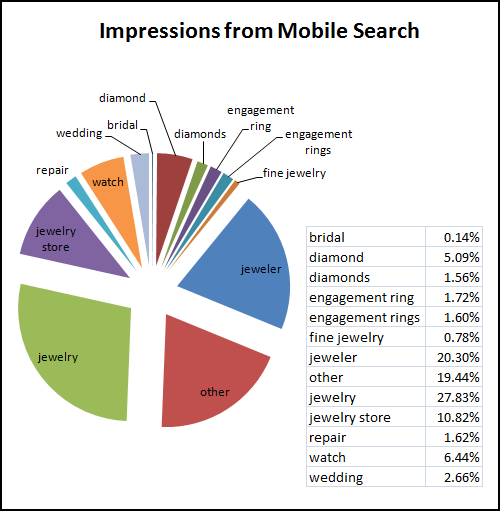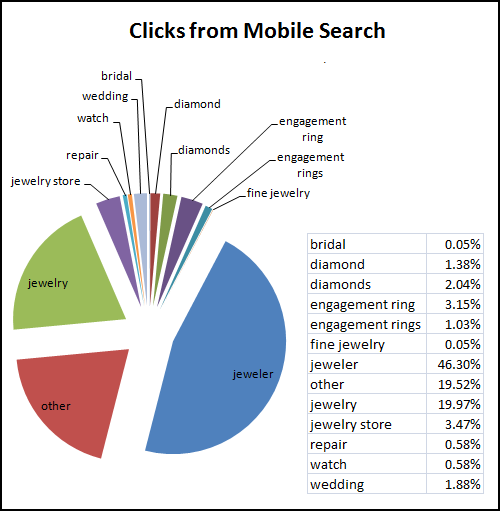
When using Google Webmaster Tools, you can view which search queries will trigger your website to appear in search results. In the past when we SEO guys would spew the phrase "search queries" it was just a fancy name for saying "keywords." In fact, you can say "search queries," and "keywords," and "search phrases" and mean the same thing.
Regardless what you called it, all you wanted to do was put the right words on your website that correspond to what people search for in the different search engines. Of course in today's world of SEO, you're not supposed to think about keywords any more, but rather, holistic topics.
When Google announced the new underlying search engine switch to Hummingbird they set the stage for a new type of search. The Hummingbird engine could more accurately sniff out newer websites and more mobile friendly websites.
Hummingbird also improved user friendliness because it can recognize spoken questions in standard sentence structure and return really good results, most of the time. To use the spoken question feature you simply open the Google app on your phone and say "Okay Google" then state your question. Sometimes you'll even get a spoken reply to your question.
For the months of November and December 2014 I set up a special type of keyword tracking that would parse through all the mobile search queries as reporting in Google Webmaster Tools. I measured the number of impressions and clicks across more than 100 retail jeweler websites.
These are the results...
Measured Keywords
I captured nearly 100,000 different phrases during the two month period then organized them using Microsoft Access. 76% of all the phrases I captured were unique, but that also means that 24% of the phrases were repeated by many different people all across the USA.
The following charts show how I grouped phrases that used these words:
* diamond
* diamonds
* engagement ring
* engagement rings
* fine jewelry
* jeweler
* jewelry
* jewelry store
* repair
* watch
* wedding
Impressions
The following pie chart shows the grouping of keyword phrases that included the above words.

5.09% of the mobile searches I recorded included the word "diamond." By comparison the desktop searches reported yesterday shows a much lower 0.05% for the same word.
Remember that I'm reporting percentages here, not specific numbers. Even though there was a lower overall quantity of mobile searches for "diamond," the percentage was higher.
There is also a huge difference between the desktop web searches and the mobile searches, in that, most of the desktop searches are really random phrases, but the mobile searches are very specific. Some examples:
* custom diamond {jewelry/ring}
* diamond appraisal
* diamond buyers guide
* diamond engagement ring under ________
* diamond ring {repair/financing/designs/with/etc}
* vintage diamond ring
* vintage style diamond ring
It can be assumed that the people searching for each one of these phrases had an immediate need. On the other hand, the randomness of phrases for desktop search appears to have longer term needs and illustrates early research. You should also take notice that when people have an immediate need, they tend to search for the singular version of the word "diamond" rather than the plural "diamonds."
Searches for Diamonds
People using mobile search phrases including the plural word "diamonds" were primarily looking for information about diamonds. I also noticed a few branded names and phrases appearing in the list.
Here are some examples:
* Le Vian Chocolate Diamonds
* Canadian diamonds
* who buys diamonds
* different types of diamonds
Of all the "diamonds" related phrases I measured, those with "Canada" or "Canadian" were clicked on the most.
Engagement Ring Searches
Most of the mobile "engagement ring" search phrases can be categorized in two ways: as a location search or a product search.
When "engagement ring" appears at the beginning of the search phrase it is usually followed by a topic or location search. For example:
* engagement ring Totowa nj
* engagement ring store
* engagement ring financing
* engagement ring setting
When "engagement ring" appears at the end of a search phrase it is usually with the intention to find a specific ring style or brand. For example:
* emerald cut halo engagement ring
* vintage style engagement ring
* kirk kara pink engagement ring
* pear shaped halo engagement ring
* round cut diamond engagement ring
* yellow and white gold engagement ring
Similar to the "diamond" phrase, people are more likely to search for the singular version of "engagement ring" because it represents their personal need, rather than the plural "engagement rings" phrase, which is more likely related to general research.
Searches for Engagement Rings
Similar to the search results seen for the plural word "diamonds," the mobile search phrases associated with "engagement rings" were heavily location based and informational requests.
Some examples include:
* engagement ring stores
* engagement rings Totowa NJ
* engagement rings for {man/woman}
* {random description} engagement rings
There are a lot of words that fit into the random description group for that last keyword, including famous, fairytale, beautiful best, classic, high end, interest free, and unique.
Using This Impression Data
This data is useless unless we can do something with it. Luckily, in this situation there's a clear path of usability with these suggestions:
SEO Suggestions for Product Pages
Create a consistent structure of product titles, headlines and descriptions that have "engagement ring" at the end of the phrase like these:
* 1ct Diamond Halo Engagement Ring
* Tacori Diamond Engagement Ring
* 1.5ct Round Diamond Engagement Ring
DO NOT use this method:
* Engagement Ring with 1ctw Diamond Halo
* Engagement Ring, Tacori Style 1234
* Engagement Ring with 1.5ct Center Round Diamond
Many SEO experts will tell you that you need to put the phrase "engagement ring" first in order to give it the most weight so Google will rank for that phrase. Don't listen to theory; instead follow what the hard data here is saying.
People are learning how to search using spoken, full sentence structure through mobile search, and Google Hummingbird is able to match those sentences to the suggestions above.
SEO Suggestions for Product Category Pages
The plural forms of the word phrases will work best on top level product category pages of your online catalog. Typically, these are the pages where you explain what visitors will find inside, and those explanations will naturally include plural words.
If your website has dedicated designer page, then you should use plural word versions in those descriptions too.
For example, it is grammatically correct to say:
We have a large selection of beautiful engagement rings in our online jewelry catalog.
Than to say:
We have a large selection of beautiful engagement ring in our online jewelry catalog.
Mobile Clicks
This pie chart shows the number of mobile clicks for my chosen keyword grouping:

Of the 4 phrases I analyzed in today's Nugget, the "engagement ring" phrase had the highest percentage of clicks. It's important to consider the correlation of the November and December months as the months when specific engagement ring purchases are being made. That correlation could be what lead to a higher percentage of clicks on a specific engagement ring appearing in SERPs.
On the other hand, the word "diamonds" was clicked more often than "diamond." A close analysis of these clicks shows that users were looking for "Canadian diamonds" and close variations. Based on this data, I can make some assumptions that the Canadian diamond market is growing, or the marketing for Canadian diamonds is attracting more attention than other diamond sources.
Information Overload
The more I sift through the collected data, the more actionable information I discover. I need to dedicate a few more days to unfolding all the information in easy to digest Daily Nuggets.
The above two pie charts hint at a lot more data for the mobile search phrases of "jeweler," "jewelry," "jewelry store," "watch," and "wedding." I'll present these in the days ahead.








